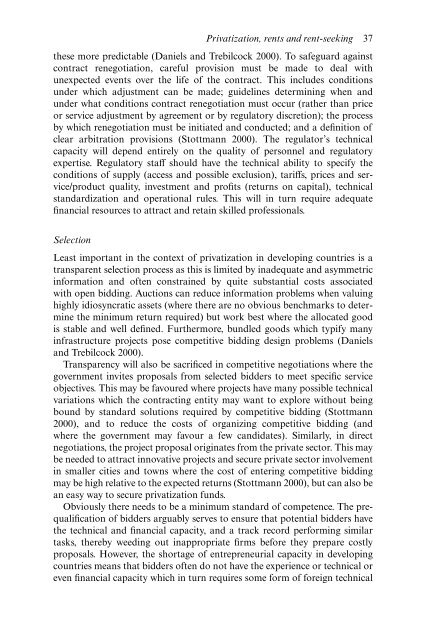PRIVATIZATION Privatization in Malaysia, Regulation, rent-seeking and policy failure
PRIVATIZATION Privatization in Malaysia, Regulation, rent-seeking and policy failure
PRIVATIZATION Privatization in Malaysia, Regulation, rent-seeking and policy failure
You also want an ePaper? Increase the reach of your titles
YUMPU automatically turns print PDFs into web optimized ePapers that Google loves.
<strong>Privatization</strong>, <strong>rent</strong>s <strong>and</strong> <strong>rent</strong>-seek<strong>in</strong>g 37these more predictable (Daniels <strong>and</strong> Trebilcock 2000). To safeguard aga<strong>in</strong>stcontract renegotiation, careful provision must be made to deal withunexpected events over the life of the contract. This <strong>in</strong>cludes conditionsunder which adjustment can be made; guidel<strong>in</strong>es determ<strong>in</strong><strong>in</strong>g when <strong>and</strong>under what conditions contract renegotiation must occur (rather than priceor service adjustment by agreement or by regulatory discretion); the processby which renegotiation must be <strong>in</strong>itiated <strong>and</strong> conducted; <strong>and</strong> a def<strong>in</strong>ition ofclear arbitration provisions (Stottmann 2000). The regulator’s technicalcapacity will depend entirely on the quality of personnel <strong>and</strong> regulatoryexpertise. Regulatory staff should have the technical ability to specify theconditions of supply (access <strong>and</strong> possible exclusion), tariffs, prices <strong>and</strong> service/productquality, <strong>in</strong>vestment <strong>and</strong> profits (returns on capital), technicalst<strong>and</strong>ardization <strong>and</strong> operational rules. This will <strong>in</strong> turn require adequatef<strong>in</strong>ancial resources to attract <strong>and</strong> reta<strong>in</strong> skilled professionals.SelectionLeast important <strong>in</strong> the context of privatization <strong>in</strong> develop<strong>in</strong>g countries is atranspa<strong>rent</strong> selection process as this is limited by <strong>in</strong>adequate <strong>and</strong> asymmetric<strong>in</strong>formation <strong>and</strong> often constra<strong>in</strong>ed by quite substantial costs associatedwith open bidd<strong>in</strong>g. Auctions can reduce <strong>in</strong>formation problems when valu<strong>in</strong>ghighly idiosyncratic assets (where there are no obvious benchmarks to determ<strong>in</strong>ethe m<strong>in</strong>imum return required) but work best where the allocated goodis stable <strong>and</strong> well def<strong>in</strong>ed. Furthermore, bundled goods which typify many<strong>in</strong>frastructure projects pose competitive bidd<strong>in</strong>g design problems (Daniels<strong>and</strong> Trebilcock 2000).Transparency will also be sacrificed <strong>in</strong> competitive negotiations where thegovernment <strong>in</strong>vites proposals from selected bidders to meet specific serviceobjectives. This may be favoured where projects have many possible technicalvariations which the contract<strong>in</strong>g entity may want to explore without be<strong>in</strong>gbound by st<strong>and</strong>ard solutions required by competitive bidd<strong>in</strong>g (Stottmann2000), <strong>and</strong> to reduce the costs of organiz<strong>in</strong>g competitive bidd<strong>in</strong>g (<strong>and</strong>where the government may favour a few c<strong>and</strong>idates). Similarly, <strong>in</strong> directnegotiations, the project proposal orig<strong>in</strong>ates from the private sector. This maybe needed to attract <strong>in</strong>novative projects <strong>and</strong> secure private sector <strong>in</strong>volvement<strong>in</strong> smaller cities <strong>and</strong> towns where the cost of enter<strong>in</strong>g competitive bidd<strong>in</strong>gmay be high relative to the expected returns (Stottmann 2000), but can also bean easy way to secure privatization funds.Obviously there needs to be a m<strong>in</strong>imum st<strong>and</strong>ard of competence. The prequalificationof bidders arguably serves to ensure that potential bidders havethe technical <strong>and</strong> f<strong>in</strong>ancial capacity, <strong>and</strong> a track record perform<strong>in</strong>g similartasks, thereby weed<strong>in</strong>g out <strong>in</strong>appropriate firms before they prepare costlyproposals. However, the shortage of entrepreneurial capacity <strong>in</strong> develop<strong>in</strong>gcountries means that bidders often do not have the experience or technical oreven f<strong>in</strong>ancial capacity which <strong>in</strong> turn requires some form of foreign technical


